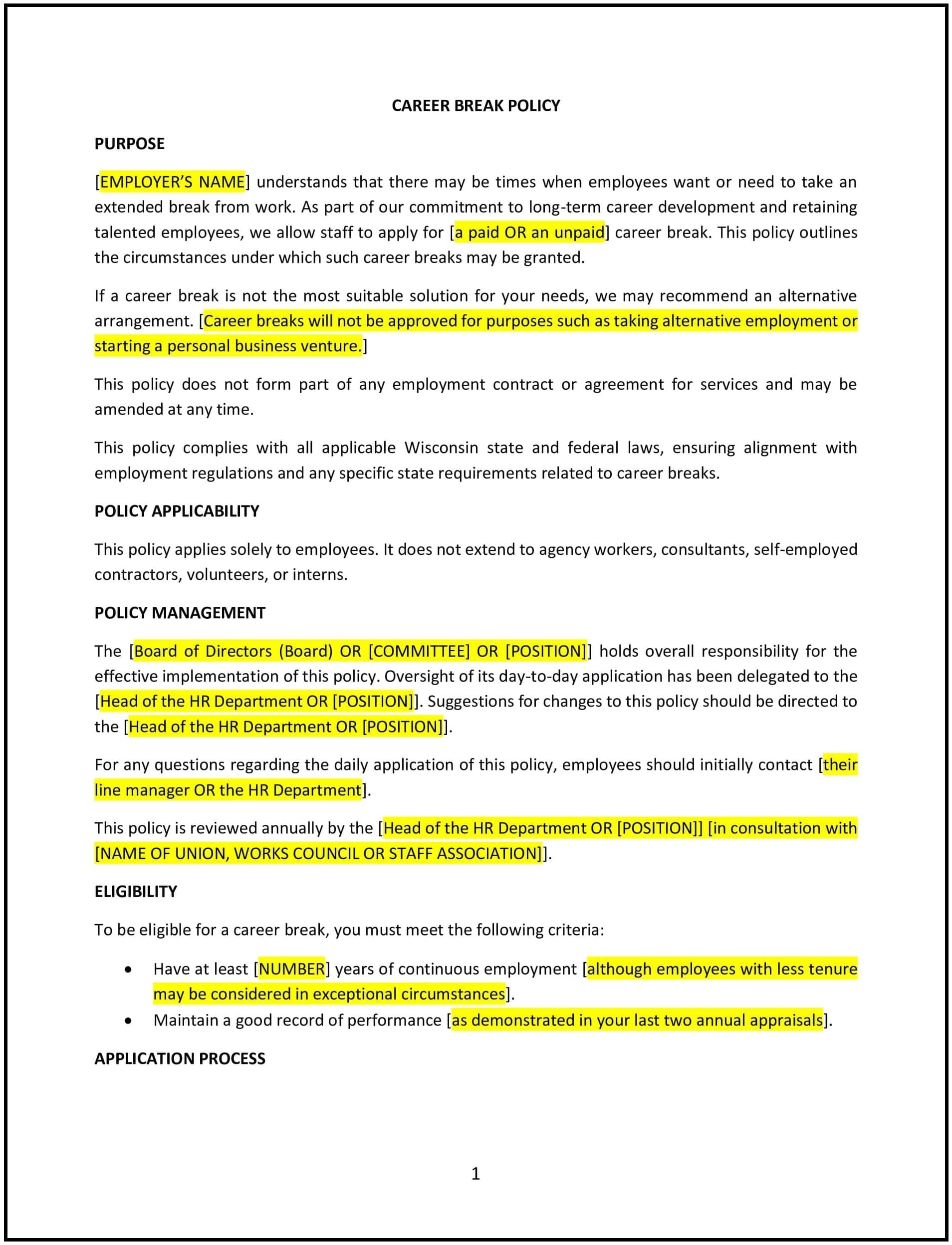Got contracts to review? While you're here for policies, let Cobrief make contract review effortless—start your free review now.

Customize this template for free
Career break policy (Wisconsin)
A career break policy helps Wisconsin businesses support employees who need an extended period of time away from work for personal reasons, such as pursuing further education, caring for family, or taking time for personal reflection. This policy outlines the conditions under which employees may request a career break, how the break will be managed, and what the employee’s status will be during the leave period.
By implementing this policy, businesses can provide employees with flexibility, help retain talented employees, and support work-life balance while ensuring that their time away from work is managed in a structured and fair manner.
How to use this career break policy (Wisconsin)
- Define eligibility criteria: Specify which employees are eligible for a career break, including factors such as length of service, position, and performance. Clarify the minimum and maximum duration of the break.
- Outline the application process: Provide clear steps for requesting a career break, including how far in advance employees must apply, what information they need to submit, and who they need to contact for approval.
- Set the terms of the break: Define whether the career break is paid or unpaid, and whether any benefits (such as health insurance) will continue during the break period. Specify any conditions for the employee’s return to work, including how their job will be handled during their absence.
- Address job protection: Specify whether employees will be guaranteed their same or a similar position upon their return from the career break, in accordance with company policies and Wisconsin state law.
- Clarify responsibilities during the break: Set expectations for how employees should remain engaged with the company (if necessary), such as staying in touch for key updates or making arrangements for job responsibilities to be covered during the break.
- Determine return procedures: Outline the process for returning to work after a career break, including any steps employees need to follow and how the company will facilitate their reintegration into the workforce.
- Address the impact on career progression: Explain whether a career break will impact salary increases, promotions, or performance reviews, and ensure employees understand how their break will affect career progression.
Benefits of using this career break policy (Wisconsin)
This policy offers several benefits for Wisconsin businesses:
- Retains talented employees: By offering career breaks, businesses can retain valuable employees who might otherwise leave the company for personal reasons, leading to higher retention rates and reduced turnover.
- Promotes work-life balance: The policy allows employees to take the time they need for personal growth or family obligations, contributing to their overall job satisfaction and work-life balance.
- Enhances employee loyalty: Offering career breaks demonstrates the company’s commitment to employees’ personal and professional growth, which can increase employee loyalty and morale.
- Reduces burnout: Providing employees with the opportunity to take a break from their careers can help reduce burnout, making employees more productive and engaged upon their return.
- Supports workforce diversity: The policy helps support employees with different needs, such as those caring for family members or pursuing further education, contributing to a more inclusive workplace.
Tips for using this career break policy (Wisconsin)
- Communicate the policy clearly: Ensure that all employees are aware of the career break policy, including the eligibility criteria, process for applying, and the impact the break will have on their employment.
- Set clear expectations: Clearly define the terms and conditions of the career break to avoid any misunderstandings regarding job security, benefits, or the impact on career progression.
- Offer flexibility: Provide flexibility in the policy to accommodate different employee needs and circumstances, allowing for a range of break durations or reasons.
- Review the policy periodically: Regularly review and update the policy to ensure it aligns with Wisconsin state laws and reflects changes in company practices or employee needs.
- Provide support for reintegration: Ensure that employees who return from a career break are provided with the necessary support to reintegrate into their roles, such as training, updates on company changes, or a gradual return to full-time work.